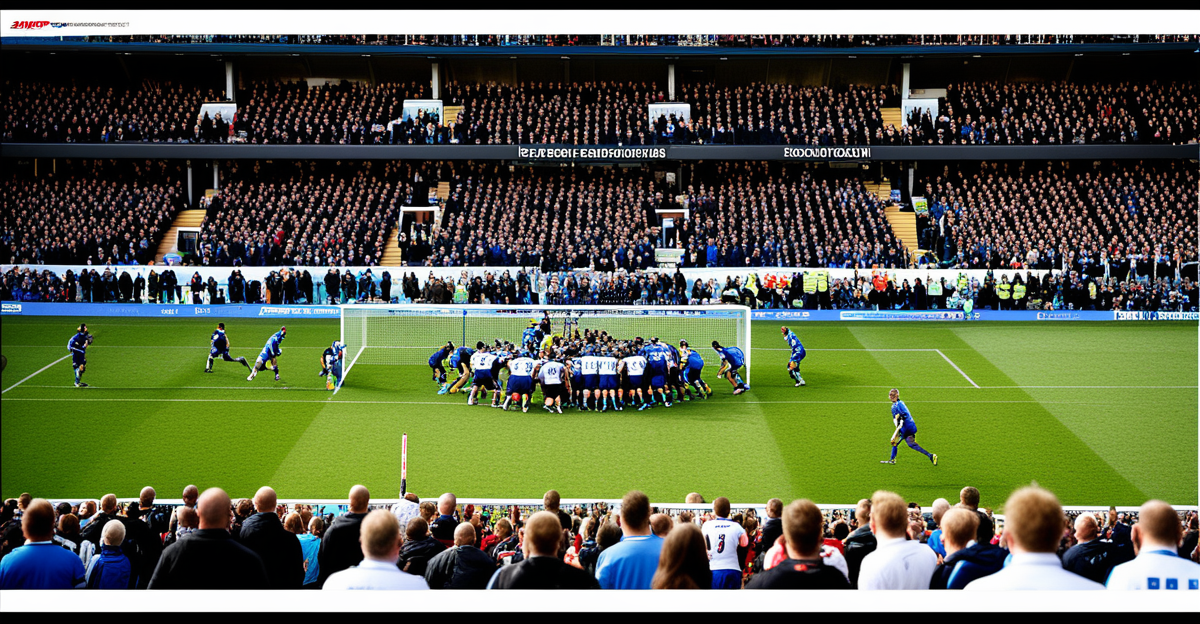Economic Impact of UK Sports Events on Local Communities
Sporting events in the UK bring a substantial financial boost to local economies, driven primarily by enhanced tourism and increased local spending. Events such as the Premier League matches, Wimbledon, and numerous regional sporting festivals attract large numbers of visitors. This influx leads to a surge in demand for accommodations, food services, and local transport, injecting significant revenue into host communities.
The local economic impact arises from multiple channels. Firstly, sports tourism generates a steady stream of visitors who spend on lodging, dining, retail, and entertainment, providing a direct financial stimulus to the area. Secondly, the presence of high-profile events elevates the visibility of host towns, often encouraging repeat visits beyond the events themselves. This mix of immediate spending and longer-term tourism creates a powerful economic engine at the grassroots level, underpinning community businesses and public services.
This might interest you : How Are UK Sports Academies Shaping Future Champions?
Understanding this dynamic highlights how UK sports events serve not just as entertainment but also as vital economic drivers. They combine to foster an environment where local markets thrive, regional employment rises, and community development is supported through increased financial resources.
Tourism and Hospitality Industry Growth
Major UK sports events, such as the London Marathon and Wimbledon, significantly drive sports tourism, drawing large numbers of both domestic and international visitors. This surge in travel creates a ripple effect throughout the tourism and hospitality sectors, markedly increasing visitor spending. Hotels experience higher occupancy rates during event periods, with many establishments reporting full bookings well in advance. Restaurants and local entertainment venues also benefit from the influx of fans, who contribute to elevated revenues through dining and leisure activities.
Additional reading : What Strategies Can Lead to Success in UK Sports?
Visitor spending extends beyond basic accommodation, encompassing transportation, souvenirs, and supplementary services, all of which enrich local economies. For example, during Wimbledon, the local hospitality industry sees a substantial boost as fans spend on premium dining, transit, and cultural experiences. Likewise, the London Marathon attracts runners and supporters who generate considerable income for hotels and eateries over several days.
These spikes in demand demonstrate how sports tourism acts as a key catalyst for local economic impact, sustaining and sometimes expanding hospitality businesses. Elevated hotel occupancy rates are not only immediate indicators of event success but also contribute to long-term industry stability by enhancing the destination’s profile among future travelers.
Economic Impact of UK Sports Events on Local Communities
UK sports events contribute significantly to the local economic impact, generating substantial revenue through various channels. High-profile events, including Premier League matches, Wimbledon, and numerous regional sporting festivals, attract large crowds whose spending fuels local markets. The primary economic drivers are sports tourism and increased local spending, both of which work together to boost community finances.
Sports tourism plays a central role by bringing domestic and international visitors who spend on lodging, dining, transport, and retail. This visitor influx injects money directly into the local economy, benefiting businesses and public services alike. Moreover, the increased visibility afforded by major events often encourages repeated visits, sustaining tourism beyond the event duration.
Local economies also benefit from the multiplier effect, where money spent circulates through various sectors, amplifying its impact. For example, fans attending a Premier League game may later frequent local shops and restaurants, increasing sales and supporting jobs. This symbiotic relationship between sports events and local commerce underpins ongoing economic development, highlighting the crucial role that UK sports events serve within their communities.
Economic Impact of UK Sports Events on Local Communities
UK sports events deliver a substantial local economic impact, playing a pivotal role in boosting community finances across the country. Key fixtures such as the Premier League, Wimbledon, and regional sporting festivals consistently attract large crowds, whose spending supports a wide range of local services and businesses. This influx of visitors primarily drives growth through two intertwined mechanisms: sports tourism and increased local spending.
Sports tourism is the dominant force behind these economic benefits. Visitors, both domestic and international, attend events and spend money on accommodations, dining, transportation, and retail within the host communities. This direct spending injects vital revenue that sustains local businesses and public amenities. For example, Premier League matches stimulate substantial visitor spending not only within stadiums but also in surrounding neighborhoods, enhancing overall economic activity.
Beyond immediate expenditures, UK sports events elevate the profile of host locations, encouraging repeat visits and extended tourism. This ongoing attraction contributes to a multiplier effect, where money spent circulates through the community, benefitting sectors such as hospitality, retail, and transport. Consequently, the local economic impact extends beyond the event days themselves, fostering steady growth and resilience in community economies.
In summary, UK sports events serve as more than just entertainment—they form a critical economic engine. By drawing visitors and stimulating sports tourism, they empower local markets, increase employment opportunities, and support broader community development initiatives.
Economic Impact of UK Sports Events on Local Communities
UK sports events generate a profound local economic impact by mobilizing significant financial resources within host communities. Major fixtures such as the Premier League, Wimbledon, and regional sporting festivals draw substantial crowds, whose spending drives growth in multiple economic sectors. The core mechanisms behind this economic boost are sports tourism and enhanced local spending, which together elevate the financial health of local economies.
Sports tourism acts as a vital conduit for this economic stimulus by attracting both domestic and international visitors. These attendees incur expenses on accommodation, food, transportation, and retail, injecting direct revenue into local businesses. For instance, Premier League matches not only fill stadiums but also stimulate surrounding hospitality and service sectors, amplifying the spending ripple effect across communities.
Moreover, beyond immediate expenditure, UK sports events raise the profile of host locations, encouraging longer-term tourism and repeat visits. This sustained attraction strengthens the local economy by perpetuating visitor spending cycles. The local economic impact also benefits from the multiplier effect, where money spent during events circulates through various industries—including restaurants, shops, and transport—fostering job creation and supporting public services.
In sum, UK sports events serve as essential economic engines, driven fundamentally by sports tourism and local consumer spending. Their role extends beyond entertainment, nurturing resilient community economies through diverse financial channels.
Economic Impact of UK Sports Events on Local Communities
UK sports events are a major catalyst for local economic impact, generating considerable financial benefits that ripple through communities nationwide. Premier League matches, Wimbledon, and regional sporting festivals stand as prominent examples, consistently drawing large crowds whose spending fuels local markets. The dual engines of this growth—sports tourism and increased local spending—form the backbone of economic vitality in host areas.
Sports tourism is particularly influential, as visitors from across the UK and abroad spend substantially on accommodations, dining, transport, and retail. This influx injects immediate revenue, supporting not only businesses directly connected to the events but also wider community services. For instance, during high-profile matches, local hotels, restaurants, and shops experience marked increases in patronage, reflecting the positive economic spillover from sports tourism.
Furthermore, these events enhance the profile of host communities, encouraging repeat visitation which sustains economic activity beyond the event itself. This ongoing attraction creates a multiplier effect, where money spent circulates across sectors, fostering job creation and investment. Local economies thus benefit from a sustained cycle of spending prompted by UK sports events, highlighting their essential role in driving financial growth and social development at the community level.
Economic Impact of UK Sports Events on Local Communities
Sporting events across the UK contribute a significant financial injection into local economies, driven fundamentally by the interplay of sports tourism and local consumer spending. High-profile occasions such as Premier League matches, Wimbledon, and regional festivals attract large numbers of visitors whose expenditures invigorate multiple sectors within host communities.
The local economic impact primarily emerges through two key mechanisms: the influx of tourists and the spending by residents and visitors alike. Sports tourism plays a pivotal role by drawing both domestic and international attendees who spend on accommodation, dining, transportation, and retail. This influx boosts revenues for local businesses, from hotels and restaurants to shops and transport services, creating a robust economic ecosystem around these events.
Moreover, event-driven visitor spending often extends beyond the primary venue, stimulating a wider local economy. For example, fans attending a Premier League game may also frequent nearby establishments, multiplying the financial benefit. This circulatory effect reinforces the strength of community economies, encouraging longer stays and repeat visits long after the event concludes.
In essence, UK sports events function as critical economic engines, with sports tourism empowering diverse commercial activities and amplifying the overall local economic impact. Through sustained visitor demand and heightened community engagement, these events underpin financial growth, job creation, and regional development.



